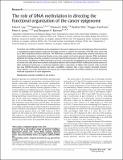| dc.contributor.author | Lay, Fides D. | |
| dc.contributor.author | Liu, Yaping | |
| dc.contributor.author | Kelly, Theresa K. | |
| dc.contributor.author | Witt, Heather | |
| dc.contributor.author | Farnham, Peggy J. | |
| dc.contributor.author | Jones, Peter A. | |
| dc.contributor.author | Berman, Benjamin P. | |
| dc.date.accessioned | 2015-05-22T19:05:25Z | |
| dc.date.available | 2015-05-22T19:05:25Z | |
| dc.date.issued | 2015-04 | |
| dc.date.submitted | 2014-08 | |
| dc.identifier.issn | 1088-9051 | |
| dc.identifier.issn | 1549-5469 | |
| dc.identifier.uri | http://hdl.handle.net/1721.1/97064 | |
| dc.description.abstract | The holistic role of DNA methylation in the organization of the cancer epigenome is not well understood. Here we perform a comprehensive, high-resolution analysis of chromatin structure to compare the landscapes of HCT116 colon cancer cells and a DNA methylation-deficient derivative. The NOMe-seq accessibility assay unexpectedly revealed symmetrical and transcription-independent nucleosomal phasing across active, poised, and inactive genomic elements. DNA methylation abolished this phasing primarily at enhancers and CpG island (CGI) promoters, with little effect on insulators and non-CGI promoters. Abolishment of DNA methylation led to the context-specific reestablishment of the poised and active states of normal colon cells, which were marked in methylation-deficient cells by distinct H3K27 modifications and the presence of either well-phased nucleosomes or nucleosome-depleted regions, respectively. At higher-order genomic scales, we found that long, H3K9me3-marked domains had lower accessibility, consistent with a more compact chromatin structure. Taken together, our results demonstrate the nuanced and context-dependent role of DNA methylation in the functional, multiscale organization of cancer epigenomes. | en_US |
| dc.description.sponsorship | Charles Heidelberger Memorial Fellowship | en_US |
| dc.language.iso | en_US | |
| dc.publisher | Cold Spring Harbor Laboratory Press | en_US |
| dc.relation.isversionof | http://dx.doi.org/10.1101/gr.183368.114 | en_US |
| dc.rights | Creative Commons Attribution | en_US |
| dc.rights.uri | http://creativecommons.org/licenses/by/4.0/ | en_US |
| dc.source | Cold Spring Harbor Laboratory Press | en_US |
| dc.title | The role of DNA methylation in directing the functional organization of the cancer epigenome | en_US |
| dc.type | Article | en_US |
| dc.identifier.citation | Lay, Fides D., Yaping Liu, Theresa K. Kelly, Heather Witt, Peggy J. Farnham, Peter A. Jones, and Benjamin P. Berman. “The Role of DNA Methylation in Directing the Functional Organization of the Cancer Epigenome.” Genome Res. 25, no. 4 (March 6, 2015): 467–477. | en_US |
| dc.contributor.department | Massachusetts Institute of Technology. Computer Science and Artificial Intelligence Laboratory | en_US |
| dc.contributor.mitauthor | Liu, Yaping | en_US |
| dc.relation.journal | Genome Research | en_US |
| dc.eprint.version | Final published version | en_US |
| dc.type.uri | http://purl.org/eprint/type/JournalArticle | en_US |
| eprint.status | http://purl.org/eprint/status/PeerReviewed | en_US |
| dspace.orderedauthors | Lay, Fides D.; Liu, Yaping; Kelly, Theresa K.; Witt, Heather; Farnham, Peggy J.; Jones, Peter A.; Berman, Benjamin P. | en_US |
| dc.identifier.orcid | https://orcid.org/0000-0003-4165-7693 | |
| mit.license | PUBLISHER_CC | en_US |
| mit.metadata.status | Complete | |
